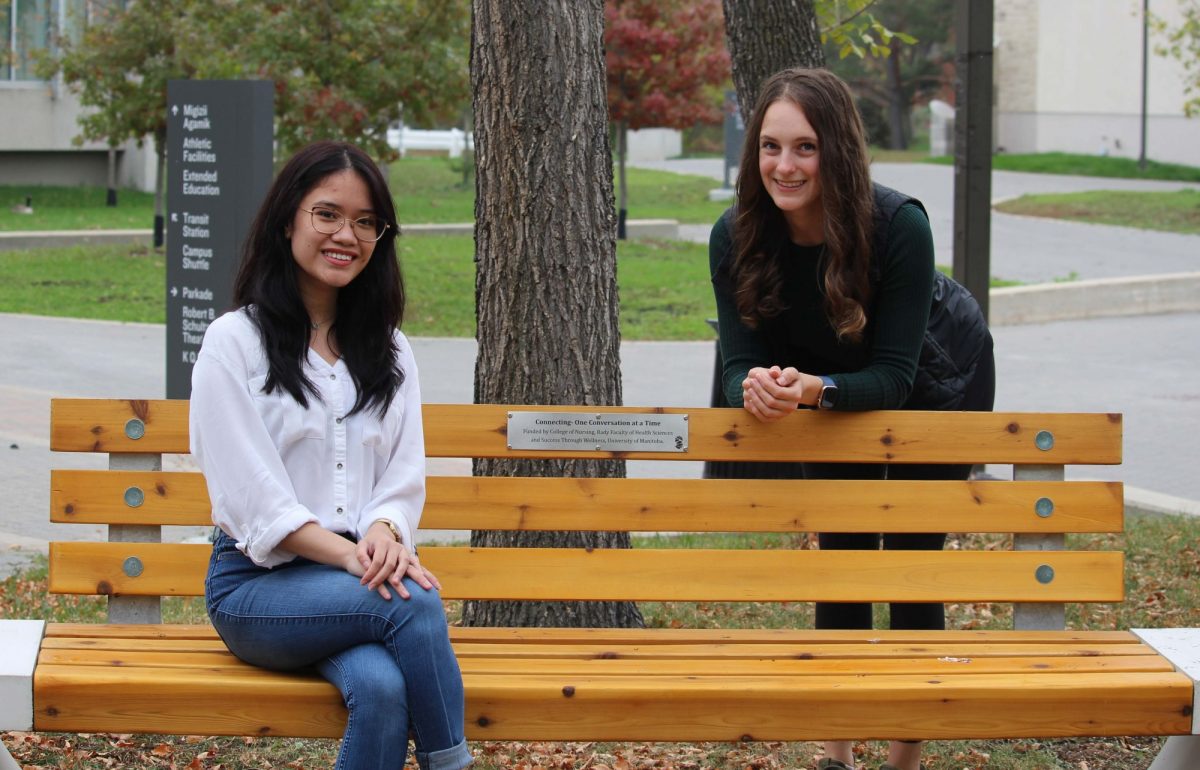
Nursing students Frances Hernandez and Gillian Laninga at the new bench promoting mental health awareness, located outside the Helen Glass Centre for Nursing.
Benches promote connection, mental health for students and community
Two new benches that offer more than a place to rest were recently installed by the College of Nursing, coinciding with World Mental Health Day on Oct. 10.
The benches, funded by the College of Nursing, Rady Faculty of Health Sciences and a UM Success Through Wellness grant are located outside the main entrance of the Helen Glass Centre for Nursing and the lower level fireside lounge at the University Centre.
The benches feature a plaque with a QR code that will lead students and the greater UM community to a new web page listing on- and off-campus mental health resources. Among the links will be a student-driven Instagram page that will promote mental health information specifically targeted at nursing students. The pages are currently under development and the codes will be installed this winter.
Lauressa Garson, a facilitator with Mahkwa omushki kiim: Pathway to Indigenous Nursing Education (PINE), a program that offers support to Indigenous students, said the resources offered via the QR code will offer a safe way for students in need to reach out, without having to do so face-to-face.
“I know that it can be difficult for people to ask for help on campus, especially when you don’t know where to go,” Garson said. “If they have a cell phone, they can scan the codes in a private space where they can feel safe, or they can go to another location and connect with the resources that they need.”
The benches are part of a new initiative called Connecting – One Conversation at a Time, which promotes mental health awareness and the concept that mental health is a community effort.
The project is led by Dr. Elaine Mordoch, adjunct professor and research affiliate at the College of Nursing, and nursing instructors Shelley Marchinko and Pat Pruden. They believe silence is a significant obstacle to receiving help and that the designated benches will be a physical reminder for all to pause, engage in conversations and build connections with others.
“Students have a lot of mental health needs, are sometimes very stressed, but they don’t always know where to go to get help, even informal help,” Mordoch said.
The team hopes the benches and events associated with the project will encourage peer-to-peer supportive conversations about mental health, informing and educating students, staff and visitors on mental health crisis, coping strategies and resources to enhance wellness and prevent suicides.
“We know that everyone can use a friendly word and some connection at any time,” Mordoch said. “With the help of James Plohman, research coordinator at MCNHR, we surveyed 95 nursing students for their ideas related to this project and plan to incorporate some of their ideas as the project develops.”
Winter Traverse, a third-year nursing student and Indigenous student representative for the Nursing Students’ Association (NSA), knows first-hand how important it is to have connections, especially as COVID-19 continues to be a concern.
“For an entire school year I wasn’t able to go home because of COVID. It was too risky because there were outbreaks where I was placed in clinical, so basically the only interactions I had at that time was when I was going to school,” said Traverse, who is originally from Pinaymootang First Nation.
She said the benches will serve as a visual reminder that social connectedness is valuable to mental health, especially to first-year students who are new to the city.
“I think that moving to the city as a first-year university student and living independently, not really knowing anyone, can be pretty intimidating,” she said.
Gillian Laninga, third-year nursing student and senior stick with the NSA, said the benches will also benefit students who are seeking help for their friends or family members.
“I think mental health resources can be hard to find if you don’t know what you’re looking for,” Laninga said. “Even if students are just walking past and not necessarily interacting with the benches, which I’m sure a lot will, it still puts the idea of mental health in their minds.”
Fourth-year student Frances Hernandez said the project will remind students about the importance of mental health for years to come.
“Students will see the benches and know that mental health is part of what we have to see as a whole, because we are not just taking care of patients physically but also mentally and emotionally,” she said.
“A few years ago we couldn’t even talk about mental health, so I also think of these benches as a symbol of how far we’ve come.”






